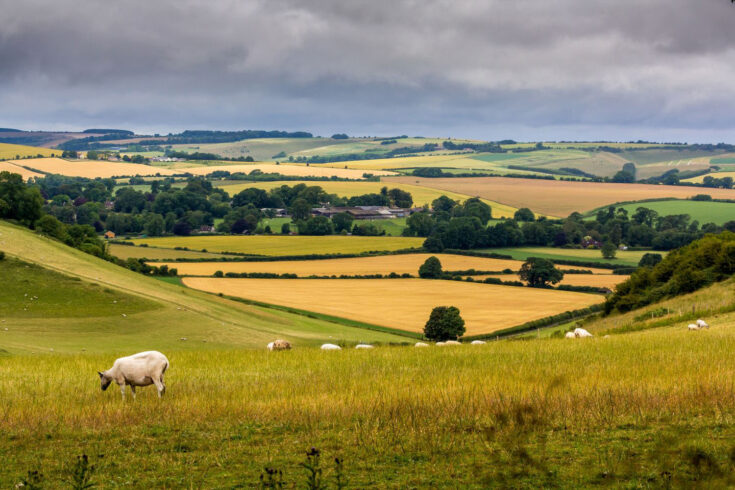We should be proud of the agriculture sector here in the UK. That said, it has not always been seen in the best light. Too often perhaps, increased production has been to the detriment of the environment in terms of:
- biodiversity
- soil erosion
- air and water quality.
So, it is not a period that is without fault and yet nor is it a period without its achievements.
We have significantly increased animal welfare and production standards with multiple farm assurance schemes. Average yields and resource efficiency have risen across a wide range of crops and livestock systems. Conditions of employment are greatly improved, and we have enhanced diversity and inclusion across the sector.
It is also true to say that many of our most treasured landscapes would not be held in such high regard were it not for the hard work and the professional stewardship of our farmers.
All of this while ensuring safe nutritious and affordable food for the whole of society.
But there is a lot more to be done!
The challenge
The sector continues to be a significant contributor to greenhouse gas (GHG) production globally and here in the UK. These are all part of the challenge:
- carbon dioxide
- nitrous oxide
- enteric methane
- ammonia.
In total the sector accounts for around 10% of all UK emissions or 45.4mt carbon dioxide equivalent (CO2-eq).
By far the greatest culprit here is methane, accounting as it does for almost half of those total emissions. So perhaps it is no surprise that many are calling for a major reduction in red meat production and consumption. This, in turn, is fuelling a cultural shift towards plant-based diets and the various forms those take.
However, methane, important though it is, cannot be the only focus. Other aspects of our land management practices also require scrutiny and reassessment if we are to meet our goals and ambitions.
But let’s not fool ourselves! We must do all of this responsibly, while keeping a close eye on productivity and our national competitiveness. A strong and resilient supply chain is necessary in order to maintain the high standards we currently enjoy while delivering on all our consumer expectations.
Clearly this is a big ask.
We must recognise that around 70% of the UK land mass is involved in land-based industries and agricultural production.
We cannot simply move to an extensive, low input, low output system if we are to make responsible use of our land asset. To do so would be to negatively impact on food security and export our responsibility on emissions, animal welfare and food standards.
We therefore have a duty to farm our land in the most sustainable and efficient manner possible. This is so important when other nations do not enjoy such good fortune.
We must also recognise that more than two thirds of our agricultural land is grassland or heath. This is spread across a wide and diverse range of geographical landscapes and climatic conditions.
So, we cannot simply switch our grassland-based farming practices to other plant and crop systems without catastrophic impact on the environment.
Such land use change would result in a wholly unacceptable release of stored carbon. It would destroy ecosystems and habitats and have a devastating impact on biodiversity. It is for this reason that current legislation protects truly permanent pasture and in many cases requires an environmental impact assessment.
The solution
So, if we are to responsibly farm our arable land and effectively and efficiently utilise our grassland, we must innovate. This applies across all sub-sectors of the industry, where resource use efficiency and the drive for sustainable productivity gains are a necessity.
Importantly businesses must remain sufficiently profitable in order to invest, improve and become part of the solution.
This means we must increase and accelerate the rates of adoption of new technologies and support the development of new technical solutions in all crop and livestock systems.

Credit: Revolu7ion93, Getty Images.
This will require the intensification of management, where decisions are based on robust data platforms, with appropriate benchmarking and key performance indicators to help raise the bar.
It means our engineers must maintain progress towards the development of integrated, compatible systems. These must be interoperable, reliable, secure, and robust so that all inputs, can be targeted to where they are most needed and not beyond.
It means that our biologists need to continue to identify new traits in our crops and livestock. Critical will be making best use of those inputs without generating unwanted consequences for our air, soil and water.
In parallel we must develop new and novel systems to supplement our traditional farming practices to bring new opportunities to the economy and the supply chain.
It means that we as consumers must make properly informed choices about our diet and consumption habits. We should acknowledge the importance of selecting the most appropriate production systems for the appropriate geographical location.
I suggest therefore, that given our reliance on grassland, we need ruminant livestock if that land asset is to play its part in feeding society.
To this end, we cannot “ban meat” or rely on lab-based solutions whose credentials are not yet proven.
Conclusion

Credit: atakan, Getty Images.
The agricultural sector here in the UK has a fantastic record of rising to major societal challenges. It contributes a critical element to our national food security. It drives revenue streams across the hugely important food supply chain which protects the national and regional rural economies.
Only by ensuring a vibrant and sustainable agricultural industry will we, as a nation, continue to enjoy all the wonderful landscapes here in the UK that do so much for our national well-being.
Of course we must tackle the very real issue of climate change and address the contribution we, as a sector, make to this global challenge.
As we have done before, we will embrace our responsibilities and deliver solutions. This, however, is only possible if government and wider society recognise the importance of the whole agrifood system, and both support our endeavours.
Contact us
Connect with Calum on LinkedIn
Connect with Innovate UK on LinkedIn
Follow Innovate UK on Facebook
You can go to the new Innovate UK website
You can go to the Innovate UK EDGE website
Subscribe to our YouTube channel
Sign up for our email newsletter
Top image: Credit: Helen Williams, Getty Images




